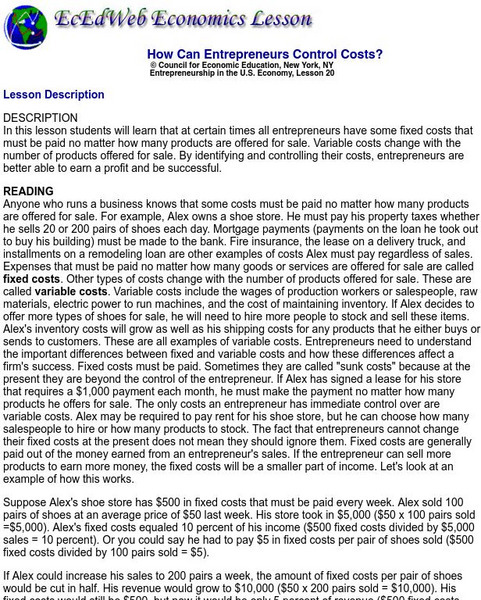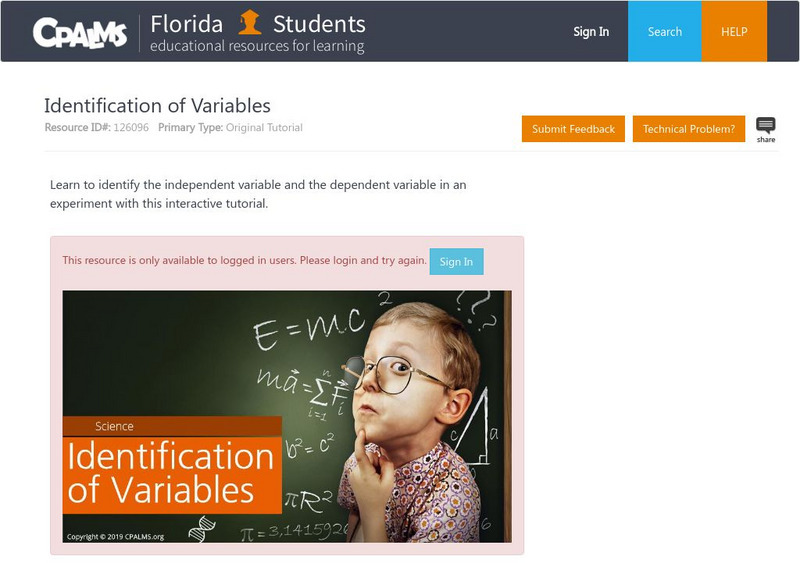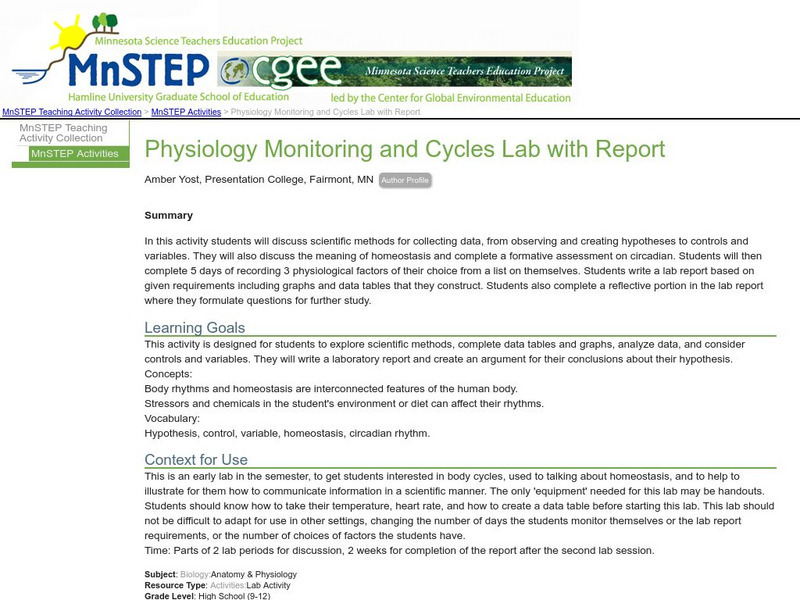Hi, what do you want to do?
Curated OER
An Egg-cellent Osmosis Experiment
Students investigate the problem of osmosis by conducting an experiment. They use eggs with the shells dissolved to tell whether fluid can move across the membranes. The experiment provides high interest for all kinds of students to keep...
Curated OER
Selecting Soil For a Sports Field
For this science worksheet, learners take part in a laboratory exploration looking at different types of soil. The soil is evaluated in order to fill the role of becoming a sports field.
Curated OER
Let's Investigate Tooth Decay
Young scholars conduct a simple investigation to explore tooth decay.
Curated OER
Ice Melting
Young scholars design investigations to test various materials to prevent heat gain in frozen water. The task assess students' knowledge of scientific inquiry including the following skills: observation, data collection, measurement,...
Curated OER
Let it Grow, Let it Grow, Let it Grow
Students investigate, through a hands-on activity, in which type of soil a bean seed grows best. They create a bar graph representing each plant's growth in different soils.
Curated OER
Revised “Understanding Nutrition” Activity
Students evaluate their current food choices. In this health science lesson, students test different drinks to rate the amount of Vitamin C content. They discuss results in class.
Curated OER
Space-Age Experiments
Students evaluate the notion of aging by reviewing some of the studies that occurred on John Glenn's space shuttle mission.
Curated OER
Enzymes in Action: An Inquiry Approach to the Effects of Enzymes
Learners experiment with enzymes as key components of chemical reactions in all living things through this series of lessons.
Curated OER
Escape! Survival of the Fittest Grasshopper
Fourth graders, in groups, design a paperclip grasshopper. They determine its ability to survive a prey by jumping high, far, or with a distracting behavior.
Sophia Learning
Sophia: Control and Variable Groups: Lesson 3
This lesson will explain the difference between a control group and variable groups, when using the scientific method. It is 3 of 4 in the series titled "Control and Variable Groups."
Sophia Learning
Sophia: Control and Variable Groups: Lesson 4
This lesson will explain the difference between a control group and variable groups, when using the scientific method. It is 4 of 4 in the series titled "Control and Variable Groups."
Sophia Learning
Sophia: Control and Variable Groups: Lesson 1
This lesson will explain the difference between a control group and variable groups, when using the scientific method. It is 1 of 4 in the series titled "Control and Variable Groups."
Better Lesson
Better Lesson: Force and Motion Investigation
Conduct an investigation collaboratively on the effect of force applied on an object to produce data to serve as the basis for evidence, by using fair tests in which variables are controlled and the number of trials are considered.
Biology Corner
Biology Corner: Identifying Variables in an Experiment
Students analyze different experiments to determine independent variables, dependent variables and control groups.
Science Education Resource Center at Carleton College
Serc: Investigating Motion: Calculating and Graphing Students Walking Speed
In this activity students will collect and analyze data of their walking speed. They will compare their speed to an outside speed walker. They will determine their speed every 20 meters up to 100 meters. They will complete five trials to...
Sophia Learning
Sophia: Independent/dependent Variables: Lesson 2
This lesson will explain the difference between independent and dependent variables. It is 2 of 4 in the series titled "Independent/Dependent Variables."
Sophia Learning
Sophia: Independent/dependent Variables: Lesson 3
This lesson will explain the difference between independent and dependent variables. It is 3 of 4 in the series titled "Independent/Dependent Variables."
American Chemical Society
Inquiry in Action: Crushing Test
This lab activity will have students crushing crystals to learn about variables and the importance of controlling those variables. Lab activity includes student and teacher instructions.
Science Buddies
Science Buddies: Scientific Method Variables/hypothesis
Find out what variables are in a scientific investigation and what the difference is between an independent, dependent, and controlled variable. Look at samples of different types of variables and find out what makes a good variable.
University of Nebraska Omaha
Ec Ed Web: How Can Entrepreneurs Control Costs?
This economics lesson explores what influences producers to supply in regard to demand. It examines fixed and variable costs, how such costs can be reduced, and how they influence production. Includes printable worksheets.
CPALMS
Florida State University Cpalms: Florida Students: Identification of Variables
An explanation of how dependent and independent variables are used during experimentation.
TeachEngineering
Teach Engineering: Are You in Control?
This lesson teaches the engineering method for testing wherein one variable is changed while the others are held constant. Learners compare the performance of a single paper airplane design while changing the shape, size and position of...
Science Education Resource Center at Carleton College
Serc: Investigating Calculating the Effect of Mass, Length and Displacement
In this physics lab activity students investigate how mass, length and angular displacement affect the period of a simple pendulum. Students control variables, testing one variable at a time, using manual techniques (stopwatch, human...
Science Education Resource Center at Carleton College
Serc: Physiology Monitoring and Cycles Lab With Report
Using physiology monitoring, students will understand how to collect data using scientific methods in this activity. Students will also learn how to communicate the finding in a lab report. Physiology monitoring will include measuring...




























